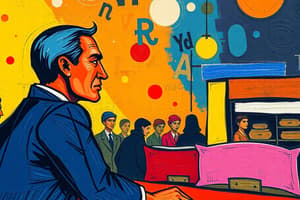Podcast
Questions and Answers
Match the following terms with their definitions:
Match the following terms with their definitions:
Wage Differential = Differences in wage rates due to various factors such as location, hours of work, and working conditions Compensating Wage Differentials = Difference in wages offered to offset the desirability or undesirability of a job North Sea Oil industry workers' wages = Higher return to adjust for the inherent dangers of their work Coal miners' wages = Paid high wages due to the dangerous nature of their work and potential health effects
Match the following concepts with their descriptions:
Match the following concepts with their descriptions:
Positive compensating wage differential = Increased wages to offer incentive for employees to take undesirable jobs Negative compensating wage differential = Lower wages offered for especially desirable jobs Wage differentials comparison = Comparison of wages between workers with different or similar skills in various industries or regions Factors affecting wage differentials = Location of company, hours of work, working conditions, and type of product manufactured
Match the following scenarios with their corresponding compensating wage differentials:
Match the following scenarios with their corresponding compensating wage differentials:
Workers in isolated areas = Employers offering higher wages due to the firm's location North Sea Oil industry workers = Expecting higher return to adjust for the inherent dangers of their work Coal miners = Getting paid high wages because of the dangerous nature of their work and potential health effects Especially desirable jobs = Offering lower wages as a negative compensating wage differential
Match the following gender wage comparison scenarios with their descriptions:
Match the following gender wage comparison scenarios with their descriptions:
Match the following elements with their effects on compensating wage differentials:
Match the following elements with their effects on compensating wage differentials:
Match the following perspectives of trade unions with their descriptions:
Match the following perspectives of trade unions with their descriptions:
Match the following roles of trade unions with their descriptions:
Match the following roles of trade unions with their descriptions:
Match the following definitions of a trade union with their descriptions:
Match the following definitions of a trade union with their descriptions:
Match the following statements about perspectives of trade unions with their corresponding approach:
Match the following statements about perspectives of trade unions with their corresponding approach:
Match the following statements about roles of trade unions with their corresponding role:
Match the following statements about roles of trade unions with their corresponding role:
Match the following roles of trade unions with their descriptions:
Match the following roles of trade unions with their descriptions:
Match the following perspectives of trade unions with their descriptions:
Match the following perspectives of trade unions with their descriptions:
Match the following perspectives of trade unions with their descriptions:
Match the following perspectives of trade unions with their descriptions:
Match the following statements about perspectives of trade unions with their corresponding approach:
Match the following statements about perspectives of trade unions with their corresponding approach:
Match the following definitions of a trade union with their descriptions:
Match the following definitions of a trade union with their descriptions:
Flashcards are hidden until you start studying
Study Notes
Matching Concepts and Definitions
- Various terms and concepts related to trade unions and compensating wage differentials need to be matched with their corresponding definitions and descriptions.
- Matching exercises include:
- Terms with definitions
- Concepts with descriptions
- Scenarios with compensating wage differentials
- Gender wage comparison scenarios with descriptions
- Elements with effects on compensating wage differentials
- Perspectives of trade unions with descriptions
- Roles of trade unions with descriptions
- Definitions of a trade union with descriptions
- Statements about perspectives of trade unions with corresponding approaches
- Statements about roles of trade unions with corresponding roles
Studying That Suits You
Use AI to generate personalized quizzes and flashcards to suit your learning preferences.




